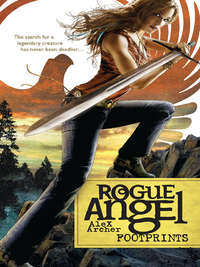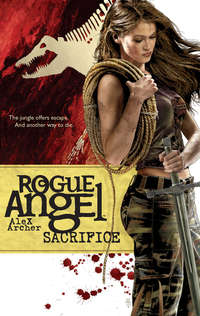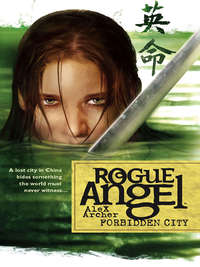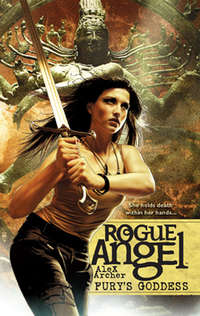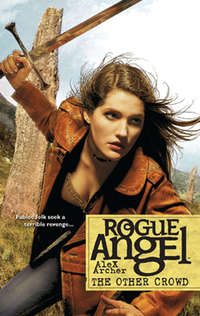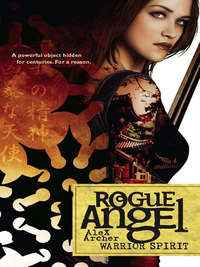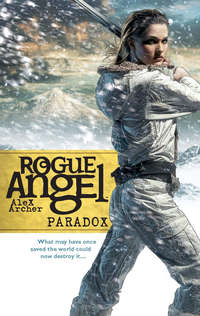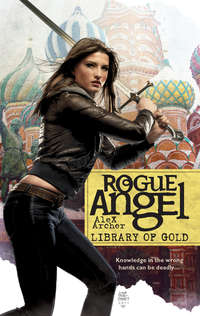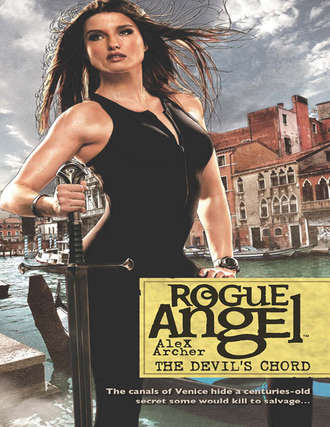
Полная версия
The Devil's Chord

Da Vinci’s greatest and most dangerous legacy…
In the midst of a lovers’ quarrel on a Venetian bridge, a pair of art thieves loses a priceless, stolen Lorraine cross to the canal’s murky waters. Suspecting a connection between the cross, Joan of Arc and da Vinci, Annja Creed’s former mentor, Roux, sends the archaeologist to oversee the search for the missing artifact. But someone else knows about the cross…knows enough to kill for it.
Despite several vicious attacks during their underwater expedition, Annja and Roux’s hired diver recovers the cross. But when the diver’s loyalties are called into question and he disappears—along with the treasure—Annja is certain there’s more to the ancient object than Roux is letting on. She soon discovers the cross is only one piece in an intricate enigma—a key that, when combined with a series of musical notes, may unlock one of Leonardo da Vinci’s most fantastical inventions. But the price Annja must pay to stop this key from falling into the wrong hands may be her life.
“Have you heard of the devil’s chord, Annja?”
Interesting conversation change. But Annja could go with it. “Of course. It was a tritone of musical notes that the church banned from being played or used in musical scores in the Middle Ages. It was thought to be evil because it’s dissonant.”
“Diabolus in musica,” Roux recited.
“The devil in music,” Annja translated. “I’m not a musician, but I do know the chord is played quite a bit nowadays. The heavy metal bands pounced on the forbidden motif, liking the evil connotation, but a lot of other musicians have used it, too.”
“It’s not so evil.”
“It’s certainly not worthy of excommunication or death. So what does a bit of music have to do with
a cross that once belonged to Joan of Arc?”
“Nothing. And everything.”
Intrigued, Annja propped her elbows on the table, ready for the rest of the story.
The Devil’s Chord
Alex Archer

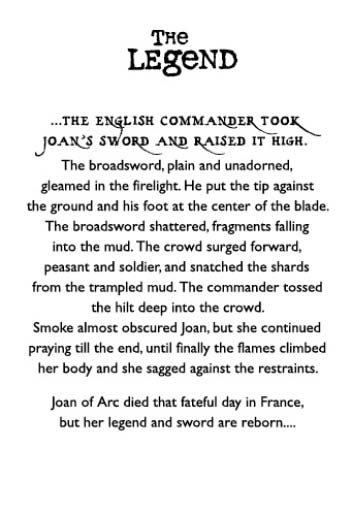
Contents
Chapter 1
Chapter 2
Chapter 3
Chapter 4
Chapter 5
Chapter 6
Chapter 7
Chapter 8
Chapter 9
Chapter 10
Chapter 11
Chapter 12
Chapter 13
Chapter 14
Chapter 15
Chapter 16
Chapter 17
Chapter 18
Chapter 19
Chapter 20
Chapter 21
Chapter 22
Chapter 23
Chapter 24
Chapter 25
Chapter 26
Chapter 27
Chapter 28
Chapter 29
Chapter 30
Chapter 31
Chapter 32
Chapter 33
Chapter 1
Milan, 1488
The night was young and the tavern stank like a hog barn, which was much preferable to the cart of rotting fish parked outside his studio near the park. Leonardo had sought escape from the stench. The tavern’s atmosphere of soused cheer always sharpened his senses. There was so much to take in and to record.
Upon choosing a seat, he’d sketched a study of the tavern keeper’s face as it had segued through the various stages of reception, duty and amiability. He’d just finished the resentful sneer the keeper cast toward the boastful gent adorned in rich velvet and Venetian lace.
When he’d spied the tall, lean man with a tankard in hand casting about for a place to sit, Leonardo had invited him to join him. Pleased by the invitation, the man sat across from him at the rough-hewn wood table. He had an open purse and enjoyed the taste of the local ale. And he was very willing to share that appetite with Leonardo.
Leonardo da Vinci sat back against the beam in the center of the tavern—his usual spot—and produced the notebook he always carried with him
“Do you mind?” he asked the man who had introduced himself as Roux. “I like to record things,” he explained, pointing at the notebook with his red chalk pencil. “Whatever passes before my eyes. People, places, things. Emotions. Designs. Ideas.”
“Don’t mind at all.” Roux tilted back the ale stein. The man had a French accent, but his sun-browned skin suggested Spanish heritage, perhaps. Leonardo had not visited France—or Spain, for that matter—enough to pick out the various dialects. “But how does one record emotions? Is it possible to draw them?”
“Oh, yes.”
Leonardo sketched the beginning lines to the old man’s face. His long Roman nose showed a commanding presence and intelligence. His skin tone promised he rode horses more often than luxuriating idly in a carriage. His eyebrows were darker than his silver-white hair, drawing attention from the lines that creased at the corners of his eyes.
“I like to capture the human face as a person experiences many emotions,” he explained. “Angst. Worry. Joy. Curiosity. Happiness shows first in the eyes. Drunkenness tends to obliterate the finer details of emotion. And worship. Ah, worship.”
“I’ll give you drunkenness after a few more steins.”
The man signaled to the serving wench, and arms loaded with a pitcher and empty tankards, she nodded that she’d return to their table when she was able.
“I write everything down,” Leonardo added as he swept his hand across the paper. “There is no order,” he continued. “But every detail I note engages my thoughts and hopefully inspires me. You see, if I don’t put it down on paper, then I can’t make room for new ideas. It’s so full.” He paused to tap his skull. “My mind. And after I’ve removed one idea, there are always new ones to fill the space.”
“You’ve a restless mind. Always thought an artist would be—I don’t know—serene. Lost in the creation of his next work.”
“But that’s it exactly,” Leonardo said. Enthusiasm had him shifting in his seat and he leaned forward to study the wrinkles that dotted the edges of Roux’s eyes. “I do get lost. If I didn’t have many other notions and interests, I might never take on the next project.”
Of course, sometimes it seemed there were simply too many projects jostling for his attention. It was entirely his own fault. He followed his muse. An erratic muse.
He tugged out his purse, which had a few coins in it but more usually held his red chalk and a lampblack pencil. Inside he also kept the key to his special box and a few cards onto which he’d sketched the Lorraine cross he’d recently finished enhancing. Or rather, altering magnificently.
Leonardo set the cards on the table beside the wilted calfskin purse, and when the wench handed him his refilled stein, he thanked her and then ignored the spirits in favor of his subject.
“I’ve seen a cross like that before,” Roux commented. “May I?” He took the sketch with his long, callus-roughened fingers. The cross featured parallel crossbars placed at equal distance on the single center bar. “Referred to as a Lorraine cross?”
“Yes. It’s a sketch of a piece I own. A gift from René d’Anjou. He was a friend. Another Frenchman,” Leonardo added, since he’d decided Roux’s accent was definitely from France.
“I knew the Count d’Anjou. Died a few years ago at his home in Aix-en-Provence. Good King René—isn’t that what they called him?”
Leonardo nodded.
“And his mother, Yolande of Aragon. She was kind and strong. A fierce woman. One of Jeanne d’Arc’s tutors.”
“Is that so?” Looking up from the sketch, the pencil gripped loosely now, Leonardo granted the man his complete attention. René had never talked much about his family. He was possessed of a mind as busy as Leonardo’s own and always jumped from one topic to the other with frequency. “Tell me more.”
Roux shrugged. “I got to know him when he rode in the siege on Orléans in 1429.”
“He and Jeanne were close,” Leonardo stated.
There were rumors whispered that René d’Anjou and the Maid of Orléans had been lovers.
“The man traveled to places far and wide in his quest for knowledge,” Roux provided. “Did you meet him here in Milan?”
“Yes, we spent some time together. As you’ve said, his quest for knowledge was immense. That man possessed an amazing mind, and I did enjoy listening to one who could speak with such confidence.”
“So this cross—” Roux gestured at the drawing “—it was once René’s?”
Leonardo nodded. “Indeed, but before he owned it, it had belonged to Jeanne d’Arc. She’d gifted it to him. D’Anjou implied it was the very cross she clutched to her breast as she prepared to die in the flames.”
The old man winced and bowed his head. Indeed, it was a terrible scenario to imagine.
“Once I had the cross,” Leonardo said, “I immediately knew I had to fashion it into something more spectacular. As you can see by the notched surface here—” he tapped the card that revealed the back surface of the cross “—it fits a specific lock, of which— That is a secret. Did you know the Maid of Orléans?”
Roux’s fingers traced the edge of the card, as if his focus was elsewhere instead of what was in front of him. Leonardo quickly sketched the change in his irises, softening the surrounding whites with a smudge of his finger.
“I did know her, yes,” Roux muttered.
Had Leonardo not been sitting so close to the man, he would not have heard the quiet admission.
Possessed of an insatiable need to learn and to experience, Leonardo could not resist the unknown. “What can you tell me about her?”
The old man looked thoughtful for several minutes. He was choosing his words with care. His attention seeming to rise from some distant chasm as he met Leonardo’s eyes. “I was one of the soldiers who rode alongside her into battle. I was with her on many occasions. I was there as she was led to the stake.”
Leonardo swallowed hard. To have witnessed such a travesty surely was a cruel burden to have to bear and one that would be difficult for a man to erase from his memory. “So you...”
“Yes, I witnessed it all. She was brave to the end. Such a tragic, senseless accusation of heresy.”
“She fought for Charles VII. For all of France. Bravely.” He leaned on his elbows, curiosity making him bold. “If you were there, by her side, did you believe she was hearing messages from God?”
“I never had reason to question her sincerity,” the man answered bluntly.
Leonardo nodded. He longed to explain many things in this world, but some did seem unexplainable.
“If I wanted to do a study, possibly a painting of her, perhaps you could provide me details of the event?”
Roux swiped up his stein. The ale ran down his chin and neck, wetting the silver-trimmed doublet that he’d tied neatly before his throat. “No,” he said and abruptly slammed the stein on the wood table.
“I understand it must be a sensitive event to recall—”
“Paint her as an innocent woman who was wronged by those whom she thought to trust.”
Sensing the man’s ingrained anger for the topic, Leonardo didn’t want to push. If he asked of the woman herself, that might restore the right mood. “She was dark of hair, yes?”
Roux slid the sketch of the cross toward Leonardo. “Do you want more ale or am I to up and leave?”
“No, please don’t leave. I’ll— I’m sorry. Perhaps some other time we can continue this discussion. I do have something else of hers I value. It came from D’Anjou. I traded a sketch for it, a piece. It is one of my prized possessions.”
“A piece?” Roux asked.
“Yes. Of Jeanne d’Arc’s sword.”
* * *
Venice, sixteen months ago
THE GONDOLA GLIDED through gentle waves. Here in the northernmost sestiere of the city, the canals glistened as moonlight added the appropriate silver highlights.
Everything should have been perfect for a romantic cruise through the city before they headed to the mainland to catch a flight home to the States. Once at JFK Airport, they would shake hands, perhaps even share a lingering kiss and then go their separate ways.
“I expected more,” the woman said, pulling away from the embrace her partner assumed she had wanted. “You lied to me.”
“Sweetie.” The man caught the gondolier’s sad look and subtle headshake. Been there, done that, buddy. “I never actually said we’d get married after the heist. I said I’d consider it. And I’ve done that. I have given it as much thought as I have our escape plans. I don’t think it’s the right time.”
“The right time?”
He always worried about her temper—it could flare at a moment’s notice. Now her agitation sent a chilling prickle along the back of his neck. Off-putting and yet so familiar. These days he should have sensed it before it hit him.
“Can we not get into this here?” he tried. “Look around. The city is beautiful. The lights are—”
“I do nothing for you until you apologize.”
He sighed and pushed away from her on the padded bench. Another gondola approached, a red-and-white-striped canopy shading the happy couple who couldn’t seem to take their eyes off one another. The woman was clutching a bunch of roses. Hey, look, a romantic couple, he wanted to point out.
Romance and roses? Hell, he’d forgotten the roses, too. That was the first thing she’d said when they’d boarded the gondola. No flowers? The woman had an exquisite bead on what buttons to push to make him feel lacking.
And when the marriage proposal she was expecting had actually been his suggestion for a two-week vacation apart while he plotted their next robbery? Her upper lip had disappeared and her mouth tightened. Her silence made him worry more than her usual anger.
Bending forward, he cracked open the cooler cover. They’d brought it along with the steel attaché case. The attaché they’d not let out of their sight for two days. The cooler he’d filled with beer, not wine. And he was pretty sure he’d be reprimanded for that oversight, as well. Did it matter anymore? There was no saving this night.
“I want to get off at that landing up there,” she said. “Tell the gondolier. I’ll walk to the hotel.”
“But we have reservations at that fancy restaurant, sweetie. You insisted.”
“Don’t sweetie me. I’m done with you. No more of this.” She shoved the cooler with a foot. “Get another safe cracker. I’m going out on my own.”
“Would you keep your voice down?” He suspected the gondolier could speak English, even though he’d shrugged and shook his head when they’d initially asked him. “Sweetie,” he said in a harsh whisper, “you know you are a terrible planner. You need me to plot the details of the job and manage the getaway. We’re a perfect team.”
The gondola slowed near the landing.
“Not this one,” the man said over his shoulder to the gondolier.
“Yes, this one,” the woman insisted. She stood as they neared the dock. “Ciao, sweetie.”
He reached for her leg as she stepped up onto shore, but it slipped through his grasp. She was an expert at folding her body into tight spots, which came in handy during a heist. And she could glide under a security laser with ease. He always marveled at how she could squeeze those generous breasts under a few inches of clearance.
“Do not call me. Ever,” she said with a definite finality. She marched into the crowded outdoor café half-filled with patrons.
Perfect escape, he thought. With people around, she wouldn’t expect him to cause a scene. Not that he was a scene causer. She didn’t want to work with him? Fine. He had the goods from their recent heist. He didn’t need her.
Bowing his head over the beer bottle, he slapped his hand onto the hard metal surface of the attaché—but his palm landed on the floor of the gondola. He checked under the padded bench seat where he’d told her to stash the case when they’d boarded.
“We go now?” the gondolier asked.
“Uh, wait. Sweetie!” he called. Even in his panic he was considerate of their rule never to use names in public. “What did you do with the case?”
She was already several yards away, walking the path that hugged the historic canal. But she’d heard him. Turning, she smirked and called out to him, “Dumped it!”
“Wh-what?” He scrambled about the floor of the wide-bottomed boat, thinking he might find a little cubby where the case might be, but there were only life vests stuffed under the seat and the cooler. “It’s not here!”
“Because it’s in the canal!”
Laughing that bold, spectacular laugh he’d always loved to listen to because it usually followed some great sex, she strolled off and disappeared into the night.
“The canal?”
He peered over the edge of the boat and frowned at the rippling water. She’d dumped the case over the side of the gondola? When had she— It must have been when he’d been digging around in the cooler for a beer, trying to avoid her disappointed gaze.
“We have to go back that way,” he directed the gondolier. “I know you understand me. North.” He thumbed the direction over his shoulder.
But despite the gondolier’s nodding agreement and his patient navigation over their previous route, the thief spotted nothing floating in the canal. The attaché had been relatively heavy, around six to eight pounds. Hell, it must have sunk the instant it had hit the water.
Taking note of the buildings in the immediate area and where they were in the canal, he directed the gondolier to his hotel.
He left Venice that night because he didn’t want to miss his flight, and by extension his one shot to maybe repair the damage he’d done to his partnership. He was still hopeful even after he’d found his airplane ticket lying on their bed. She’d bought the tickets because she had always managed their finances. Foolish move on his part.
Equally foolish was his thinking that he might have had eight or nine hours on a flight to convince her not to dump him. She hadn’t been in the seat next to him on the plane home. Must have stayed behind?
His bad luck continued when he arrived at the apartment they’d shared in Manhattan, and found his bank account emptied and all the keys and combinations to their secret hiding spots gone or empty.
A knock on the door had been followed by the flash of an NYPD badge. Accompanying the cop had been a man from Interpol.
A woman scorned knew how to inflict revenge on a man’s soul. Maybe he should have proposed after all.
Chapter 2
Annja Creed checked the cell phone’s screen. She had the phone set to vibrate only because she was conducting an interview. A name appeared above the long-distance number. What did that man want with her now? He’d have to wait. She put the phone aside on the laminated table.
The woman sitting across from Annja in the bistro twisted the end of her napkin nervously. She was called Sirena. That was it—no last name. Doug Morrell, Annja’s producer, had made contact with her online. A segment for another episode of Chasing History’s Monsters.
Beside Annja in the booth sat Ian Tate, her cameraman. He worked freelance and was based in Scotland, but was fond of traveling the world. He was short of stature yet filled with the adventurous spirit required for the job, and she had gotten along with him as soon as they’d shaken hands and he’d teased her about this assignment.
They’d met up yesterday afternoon to film shots of the scenic shoreline here at Isola delle Femmine, a town in Palermo, Italy. The translation of the town’s name was the Island of Women. Annja hadn’t done any research on that before arriving, but she seemed to recall there had once been a women’s prison on a nearby unoccupied island.
Sirena’s hair spilled to her elbows in pale brownish-green waves. Annja wondered if it was a dye job gone wrong or if the woman had purposely chosen the muddy tones. She hoped Serena hadn’t paid for it. It wasn’t well done, and she needed a retouch.
“So you said you’ve been living with a man for three years and he won’t release you?” Annja posited.
The mythology on selkies fascinated Annja, but she didn’t believe in them for a moment. The idea of a seal-like creature coming to shore and shedding its skin to transform into a beautiful woman... Well.
On the other hand, this was exactly the sort of story Chasing History’s Monsters sought. Something her fans would eat up.
“Yes. Matteo has hidden my pelt so I cannot go home,” Sirena said. She toyed with the ends of her seaweed-colored hair. Bright, glossy gray eyes always seemed to be filled with tears, but not a one ever ran down her cheek. “I love him, but...” She glanced out the bistro’s window. Across the street the shore sat close. Seagulls swept down from the blue sky and tourists headed for the beach.
“But your home is in the sea,” Annja finished for her. She glanced to Ian. He gave her a thumbs-up. The guy was good at hiding his smirk. So long as he got this conversation on film, that was all that mattered. “Do you ever go in the water now? Swim in the sea? What would happen if you did?”
“I’d sink,” Sirena said. The waif sighed heavily. “When in this human form I am bulky and unskilled in the water. But I do like to soak in the bathtub for hours. Matteo laughs at me because I insist on remaining even after the water has grown cold.” She shivered and pushed aside her empty coffee cup.
Annja was not a good judge of another couple’s relationship. But something about Sirena seemed wrong. And it wasn’t at all related to the bleak possibility she may have once lived in the water.
She reached across the table and placed a hand over Sirena’s, knowing Doug would whoop when he saw the footage. Whenever she could capture an emotional moment, her producer always rubbed his fingers together in the universal money sign. Ratings gold, he’d say.
But she wasn’t forcing this feeling. She was genuinely concerned for Sirena.
“Are you and Matteo okay, Sirena? Is he...harming you?”
The woman’s head snapped up, and her gaze met Annja’s briefly. She pulled her hand from Annja’s and reached for the macramé purse at her hip and slid out of the booth so quickly, Annja slammed into Ian in an attempt to follow her.
The cameraman shuffled out of the booth, allowing Annja to pursue the escaping interviewee.
“I’m sorry, the interview is over,” Sirena said firmly. “I thought you wanted to know about my kind, not delve into my personal life. I have to leave now. Please don’t follow me. You are not welcome at my home.”
“Sirena, I’ll tell him to turn off the camera.”
Annja nodded to Ian, and he lowered the camera. She rushed after the anxious woman, who hustled outside.
On the sidewalk, Annja grabbed Sirena by the arm, standing so close she got a whiff of salt, as if Sirena had been swimming in the ocean and hadn’t rinsed off. “Wait. You can talk to me, Sirena. Woman to woman.”
Sirena tugged away from Annja’s grasp. “You could never understand the sacrifice I made for love.”
With that, she scampered across the street, and for the first time, Annja noticed that beneath the long skirt dusting her ankles, Serena was barefoot. A bohemian refugee plunked in the middle of a seaside village? Probably not a drastic leap to concoct and believe in her story of waves and woe.
“You think she’s going to be okay?” Ian asked from behind Annja.
“I’m not sure.”
Sirena stopped at a beat-up red pickup truck. A man slid out from behind the wheel and kissed her. When she spoke to him, his eyes darted across the street and targeted Annja.


